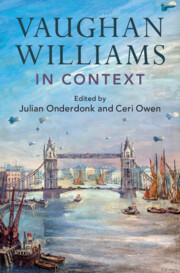Book contents
- Vaughan Williams in Context
- Composers in Context
- Vaughan Williams in Context
- Copyright page
- Dedication
- Contents
- Illustrations
- Graphs and Tables
- Musical Examples
- Notes on Contributors
- Acknowledgements
- Editorial Note
- Bibliographic Abbreviations
- Introduction
- Part I Biography, People, Places
- Part II Inspiration and Expression
- Part III Culture and Society
- Part IV Arts
- Part V Institutions
- Chapter 24 ‘Wanting’ the Home-Grown Composer:
- Chapter 25 Concert Life and Programming
- Chapter 26 The Arts Council and Evolving Public Policy
- Chapter 27 The Second World War:
- Chapter 28 Working with the BBC
- Part VI Reception
- Further Reading
- Index of Works
- General Index
Chapter 25 - Concert Life and Programming
from Part V - Institutions
Published online by Cambridge University Press: 28 March 2024
- Vaughan Williams in Context
- Composers in Context
- Vaughan Williams in Context
- Copyright page
- Dedication
- Contents
- Illustrations
- Graphs and Tables
- Musical Examples
- Notes on Contributors
- Acknowledgements
- Editorial Note
- Bibliographic Abbreviations
- Introduction
- Part I Biography, People, Places
- Part II Inspiration and Expression
- Part III Culture and Society
- Part IV Arts
- Part V Institutions
- Chapter 24 ‘Wanting’ the Home-Grown Composer:
- Chapter 25 Concert Life and Programming
- Chapter 26 The Arts Council and Evolving Public Policy
- Chapter 27 The Second World War:
- Chapter 28 Working with the BBC
- Part VI Reception
- Further Reading
- Index of Works
- General Index
Summary
The chapter surveys the varied contexts within which Vaughan Williams’s concert music was performed in Britain, showing how he developed his distinctive voice within established frameworks of concert life around the country.
In London, opportunities before the First World War were at first concentrated on vocal and chamber concerts, with large-scale works generally heard outside the capital, as at the Leeds and Three Choirs Festivals. A surge of public interest in European modernism in London during the 1910s was of only limited value for British composers, but the premiere of the London Symphony in 1914 proved a landmark in establishing Vaughan Williams’s reputation in the orchestral sphere.
After the war, his position began to solidify, not least through Adrian Boult’s advocacy in Birmingham and at the BBC. But the latter’s role in encouraging a new wave of modernist music offered a further threat to British composers (repertoire graphs of the 1912–13 and 1933–4 seasons point up the similarity). Nevertheless, the chapter suggests the possibility of co-existing streams of alternative new musics, and Vaughan Williams was deliberately positioned in this way, not least through the astringencies of the Fourth Symphony.
After 1945 his music was celebrated rather more formally in various cycles of symphonies, but a persuasive new advocate emerged in John Barbirolli at the Hallé.
Keywords
- Type
- Chapter
- Information
- Vaughan Williams in Context , pp. 215 - 223Publisher: Cambridge University PressPrint publication year: 2024



